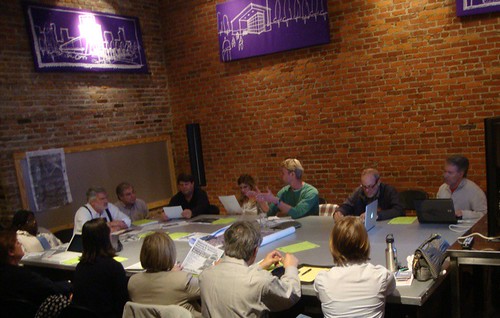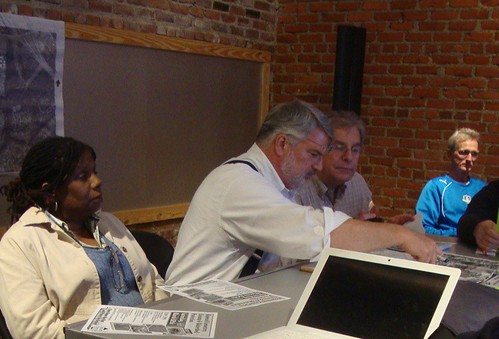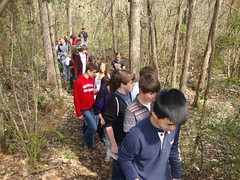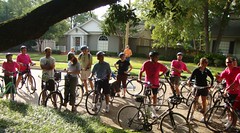In attendance: Loren Demerath, Feico Kempff, Lee Jeter, Peter Moncrief, Garrett Johnson, Susan Keith, Cynthia Keith, David Aubry, Brian Salvatore, Malcolm Stadtlander, Bonnie Moore, April Dahm, Murphy Cheatham, Robert Trudeau, Maurice Loridans
As usual, the radio show “Time for ABetterShreveport” was broadcast at 5:00 on 91.3 preceding the 6:00 meeting. This week, the topic on the radio show was adjudicated properties featuring guests, Malcolm Stadtlander (who, as Property Management Administrator for the city is in charge of adjudicated properties), Bonnie Moore (who, as Director of Community Development for the city, has put adjudicated properties to use for communities), and Monty Walford (who, as a former city councilman, has experienced the difficulties with handling adjudicated properties, and mentioned on air how the city's ordinances need some teeth). The meeting was devoted to the same topic.
ADJUDICATED PROPERTIES
The discussion started with it being noted how fewer adjudicated properties tend to exist in wealthier communities; it is remarkable from DDA Director Liz Swaine's email how many (over 280) exist downtown.
Jeter, a director of the Fuller Center, asked about getting access to adjudicated properties. Getting the property transferred for the benefit of reconstruction is sometimes a problem. Stadtlander said the law has changed such that the city is no longer making donations to non-profits. BUT, if no one else is interested in it the non-profit can make a minimal offer because there is no minimum bid, and if the city government decides it is a surplus, it can be awarded. Moore said most of the non-profits get their properties from Community Development and that that city office incurs the cost and provides that service. Typically they've been the vehicle that has transferred the property. In the past there was no restriction on what it could be used for; but it now needs to be used for housing if its being donated. But the city is no longer donating properties because there's no minimum bid. You can buy it for a dollar if the property is declared a surplus by the council.
It was noted there is still in place the policy that property owners adjacent to adjudicated properties can buy the property for a dollar if the buyer has maintained it for one year. Dahm asked if there was any way to know if anyone else is bidding on the property. Stadtlander would know if the application goes through the city; whatever body is taking care of the sale would know. You find out from them what's being sold.
There is a $300 dollar application fee that's required to buy even a $1 property; and it's refundable if you don't win the property in the auction. Community Development (CD) does not have to pay that fee. CD does make an annual plan each year and a non-profit's project has to be part of that plan for CD to donate property to them. There's a huge problem with not being able to get clear titles. When the city seizes the property there are no fees and you can get clear title; but you pay appraised value and the city has to then pay it. (In subsequent email exchanges after the meeting, it was noted a solution to this solution problem should be pursued, such as asking council members if there is a particular solution for which they need to generate political support. This will be a item in the agenda of ABS' next meeting.)
When asked about appropriation of property, Stadtlander noted that the city does occasionally expropriate property but it has to pay market value for it.
Steph Pedro asked Bonnie and Malcolm how they feel about the Baton Rouge Redevelopment Authority. Moore noted that there's no equivalent in Shreveport; it would maintain the property, develop it, etc., and that it's a tremendous tool for redevelopment. What they're doing in Baton Rouge and New Orleans is phenomenal, she noted.
Pedro also asked about their opinion of the environmental court in those cities. Bonnie said those kinds of things are absolutely necessary. Asked if this city administration knows what they are, Bonnie said they do and just need to meet with the courts. Pedro asked Moore and Stadtlander if this group could support that kind of idea, and also if they like land trusts. Bonnie said its an educational process to teach people that they won't be run over by a trust or an environmental court.
Trudeau asked about Concordia Place and Moore brought out maps showing how they'd pieced together adjudicated and undeveloped land to create a development that added value to that area. 69 lots in Stoner Hill and they are adding to it. They're going to go down the block to do in-fill development as well. It was noted that a lot of old growth trees were cut down to make that development, lower the value of what it would otherwise be, and how we need a tree ordinance. (Later is was noted that the firm contracted to design it was not one that included urban planning.)
Moore noted that the city, though, is trying to get out of the development business; they'd like non-profits can take over; it's onerous for the city. Congress was trying to change the culture of housing authorities; you'll see a lot of mixed income and mixed used projects; also, now you can use Section 8 vouchers for home ownership. The people that buy the homes in Concordia Place are largely first time home owners or close to it—first home within the last three years. The low income threshold is $42,000 per year for a family of four.
The non-profits that CD might donate properties to could be lots of different things that allign with their interests.
Dahm asked about a property that is adjudicated on Texas Avenue, the corner lot of Cotton and Texas; how is that involved?
It was noted that community planning needs to be emphasized for that area. There's been a concern about not involving residents and stakeholders sufficiently. Moncreif mentioned there will be planner who will be working with the stakeholders. It will not be Free who is not a planner. Moncreif (also on the board of SRAC in addition to working with the Fuller Center) doesn't think all the details of the common have been put together so it'd be good to probably “hold your powder” until more comes together.
Salvatore imagined it was a delicate balancing act to make your properties affordable but also to provide taxable revenue. They're not going to go over $100,000 in assessed value. They do provide revenue, but not to the parish, if they're at $75K. The higher assessed values cause higher taxes. The crime rate goes down with fewer adjudicated properties; there is more reinvestment in those neighborhoods. The income levels of the target population for the Fuller Center is in the $20,000 per year range. They believe in mixed income developments.
Jeter said Fuller Center really doesn't compete against anyone with the large number of people who live at low income levels and the large amount of adjudicated property. It was asked if people have to be Christian to participate with the Fuller Center. Jeter explained that it began out of the Habitat for Humanity. Home owners and volunteers do not have to be Christian but it is a faith-based organization and a ministry. The principle of sweat equity is part of it and paying off the house's value. That makes for the personal investment in the property. Owners go to first time home buyers class. The only thing that restricts the numbers of homes they build is properties. They build based on need. It they have the property with clear title they can build. (But getting clear title, as noted, can be a huge problem. Again, how ABS can contribute to the solution will be an agenda item at the next meeting.)
Aubry announced that he talked to Shreveport Times about the bond issue. He serves on a volunteer basis on the board. The article on Sunday misrepresented reality. Burke Klienpeter received $500K not $1.5 million. The other firm received no money from the city. In 2010 they received $31K, not $500K. Brad Graff is part of a local firm that is working on the Youree-King's intersection. The city pays for the design and the state pays for the construction. Planning for meeting that intersection need goes back to 1988. The information the Times used was from the budget made in 2009, well before the actual spending that occurred later; they should have checked to see what was actually spent. Mike Strong had asked Liz to make the video, not the Mayor. And, as noted, she did it pro bono, only the photographer was paid, and Burke Klienpeter had no editorial control but were listed in the credits.
Aubry bemoaned the fact that two local people have been attacked with misinformation because someone wants to derail the bond issue. When Aubry complained to the Times they said he was the only one who had complained. ABS moved to send a letter to the Times.
Salvatore suggested we use one of Trudeau's and Keith's former Marget High students, now a professor of ethnomusicology, Tracy Laird, to research a corner on the west edge along Common to see what Ledbelly's history is there.
On April 11th Sabra Hicks and Misty Alexander of the YMCA and Camp Forbing will come to talk about how ABS might help with promoting the Fit Cities Challenge. (They'll also be guests on the radio show that day.)
The next meeting (Monday, April the 4th) will cover a range of issues, including:
- a report on the grants being written by Pedro and Majors for an area system of bike “lanes,” and for planning for how the Coates Bluff greenway would link to more neighborhoods.
- a meeting that took place this week between ABS and representatives of Centenary College about linking the Coates Bluff greenway and trail to surrounding neighborhoods. Demerath, Pedro, Caroline Majors and Kim Mitchell met with President David Rowe, Vice President of Finance Bill Ballard, and Environmental Studies professor Jeanne Hamming to discuss Centenary's role in taking the lead in convening the potential partners to move ahead on the project and develop a vision for it.
- a meeting Demerath had with Barbara Davis, a professor of accounting at Centenary to help file our non-profit status.
- how ABS can contribute to a solution to the problem getting clear title on adjudicated properties





